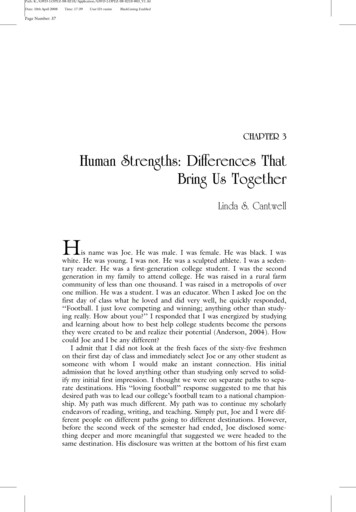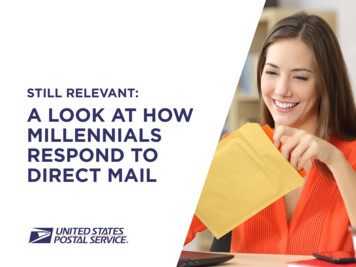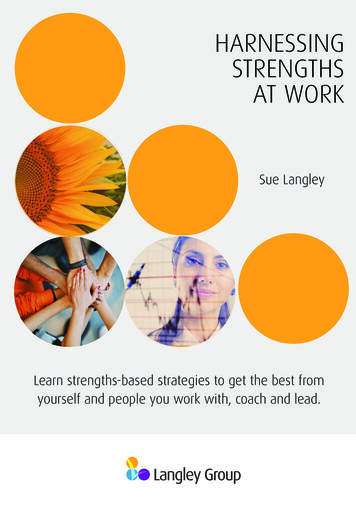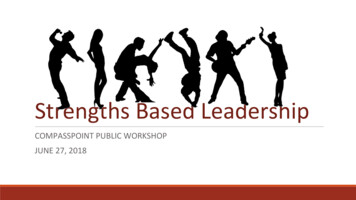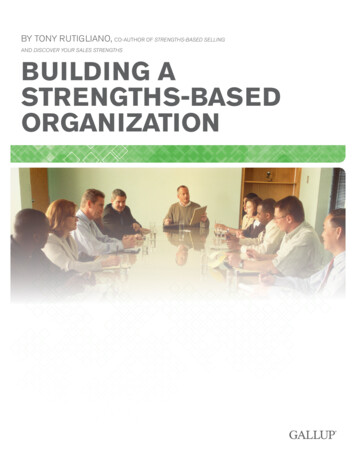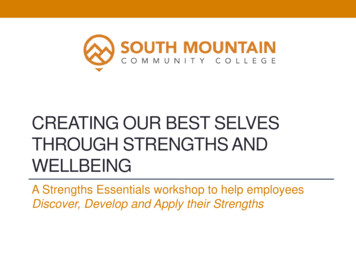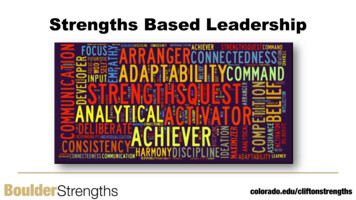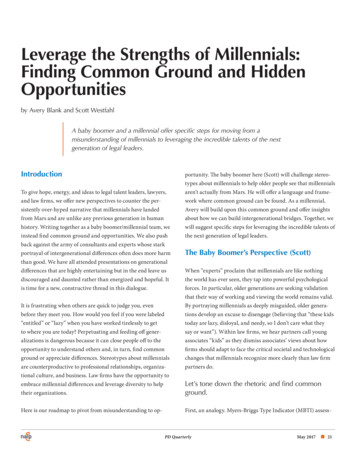
Transcription
Leverage the Strengths of Millennials:Finding Common Ground and HiddenOpportunitiesby Avery Blank and Scott WestfahlA baby boomer and a millennial offer specific steps for moving from amisunderstanding of millennials to leveraging the incredible talents of the nextgeneration of legal leaders.IntroductionTo give hope, energy, and ideas to legal talent leaders, lawyers,and law firms, we offer new perspectives to counter the persistently over-hyped narrative that millennials have landedfrom Mars and are unlike any previous generation in humanhistory. Writing together as a baby boomer/millennial team, weinstead find common ground and opportunities. We also pushback against the army of consultants and experts whose starkportrayal of intergenerational differences often does more harmthan good. We have all attended presentations on generationaldifferences that are highly entertaining but in the end leave usdiscouraged and daunted rather than energized and hopeful. Itis time for a new, constructive thread in this dialogue.It is frustrating when others are quick to judge you, evenbefore they meet you. How would you feel if you were labeled“entitled” or “lazy” when you have worked tirelessly to getto where you are today? Perpetuating and feeding off generalizations is dangerous because it can close people off to theopportunity to understand others and, in turn, find commonground or appreciate differences. Stereotypes about millennialsare counterproductive to professional relationships, organizational culture, and business. Law firms have the opportunity toembrace millennial differences and leverage diversity to helptheir organizations.Here is our roadmap to pivot from misunderstanding to op-portunity. The baby boomer here (Scott) will challenge stereotypes about millennials to help older people see that millennialsaren’t actually from Mars. He will offer a language and framework where common ground can be found. As a millennial,Avery will build upon this common ground and offer insightsabout how we can build intergenerational bridges. Together, wewill suggest specific steps for leveraging the incredible talents ofthe next generation of legal leaders.The Baby Boomer’s Perspective (Scott)When “experts” proclaim that millennials are like nothingthe world has ever seen, they tap into powerful psychologicalforces. In particular, older generations are seeking validationthat their way of working and viewing the world remains valid.By portraying millennials as deeply misguided, older generations develop an excuse to disengage (believing that “these kidstoday are lazy, disloyal, and needy, so I don’t care what theysay or want”). Within law firms, we hear partners call youngassociates “kids” as they dismiss associates’ views about howfirms should adapt to face the critical societal and technologicalchanges that millennials recognize more clearly than law firmpartners do.Let’s tone down the rhetoric and find commonground.First, an analogy. Myers-Briggs Type Indicator (MBTI) assess-PD QuarterlyMay 201721
Leverage the Strengths of Millennials: Finding Common Ground and Hidden Opportunities: Blank and Westfahlments help teams by providing a non-judgmental language andframework to discuss team members’ differences in communication and working styles. Studies show that team successis highly correlated with creating “psychological safety” andallowing team members to contribute equally and fully. Teamshelp create psychological safety by using MBTI concepts to reflect without judgment and resolve issues arising out of individualteam members’ different communication and working styles.Since that is true, let’s begin a new dialogue about generationalpreferences with this first insight rooted in common ground:We need a similar language and framework to describe whatis happening across generations in the workplace. Charts thatsimplistically lay out what each generation “wants” or expectsat work often create more resentment than understanding.Conversations devolve into whether a generation’s preferencesare justified, fair, and/or “right.” By contrast, because the MBTIframework asserts that type “preferences” (e.g., introversion vs.extraversion) are naturally distributed across the human population, type preferences and related differences are not viewedas right or wrong. They just “are.” People accept them and thenwork to resolve differences.Let’s account for generational preferences in adifferent, less judgmental way.Foundationally, a non-judgmental wayto speak about generational preferencescan begin within a deeper understandingof the psychology of motivation.What motivates each generation is more or less constant.We all want to do meaningful work, have ownershipand be included in important decisions about it, anddevelop our talents so that we are maximizing ourstrengths.If motivational factors are constant, what explains differencesin workplace generational preferences? We offer this secondinsight:While motivational factors are constant, what does varyover time is the social — and increasingly technological — context in which people are able to act upon theirmotivations to optimize them.Let’s illustrate this through a debunking of a few key mythsabout millennials:Myth one: Millennials are “needy” and want to becoddled/encouraged with positive feedback in a waythat prior generations have not been.Foundationally, a non-judgmental way to speak about generational preferences can begin within a deeper understandingof the psychology of motivation. Consider this: When we seea play by Shakespeare, we realize that even though centurieshave passed, “after changes upon changes we are more or lessthe same” (quoting Paul Simon for our baby boomer audience).All that Shakespeare understood about what motivates peopleremains true today. In Daniel Pink’s book Drive: The SurprisingTruth About What Motivates Us, the three powerful intrinsicmotivational factors identified — mastery, meaning, and purpose — apply across generations and have huge implications foreveryone in the workplace.Let’s face it, we ALL crave feedback, particularly when it is positive. We pick on millennials because they are simply more vocalabout their needs. Why are they more vocal? The answer lies inthe social and technological environment in which millennialsexperience feedback and act upon their motivational need forit. In other words, we aren’t experiencing a shift in the basic human need for feedback, reassurance, or understanding. Rather,millennials and the social media tools they are developing areleading us all in a significant shift towards a more transparentand feedback-driven world. Millennials aren’t more needy thanpast generations; they are simply more empowered to ask forwhat they want.PD QuarterlyMay 201722
Leverage the Strengths of Millennials: Finding Common Ground and Hidden Opportunities: Blank and WestfahlWhen I was a young lawyer, I never received useful feedback.All I received was the generic, annual conversation about mysalary and maintaining or increasing my hours. I was frustrated. I wanted to know what I could do to improve as a legalprofessional and where I stood on the path toward partnership.I wanted to be able to make career decisions and daily choicesaround my work that would align with my long-term interests.But with no feedback, it was nearly impossible to get it right.My needs were not different from the needs we see expressedtoday by millennials.What is different? Millennials have grown up in the mostfeedback-intensive environment in world history. From theirteachers and parents, they have been receiving quick corrections, information, and communication. Their environmenthas shaped their expectations. It is encouraging to see thatmillennials have moved us closer to a world where people witha growth mindset can request and receive feedback and realizemore of their human potential. With feedback, they have beenable to make choices about where to spend their time, basedupon a clearer understanding of their natural talents.Millennials know the score and keep scorepublicly in their online lives in ways that aremuch more Darwinian and “tough” thananything prior generations had to experience.Naysayers suggest millennials are unable to accept negativecriticism and accept failure because they all received trophiesjust for participating. Thus, millennials aren’t “tough” and havefalse assumptions about their own value, skills, and abilities.This simplistic view ignores how self-aware people are abouttheir own worth, even when being awarded a trophy, and, moreimportantly, how peer-based feedback works in the digitalage. Whether or not parents, schools, or athletic teams awardtrophies, millennials know the score and keep score publicly intheir online lives in ways that are much more Darwinian and“tough” than anything prior generations had to experience.You have to be a tough young person to survive any kind offailure in the world of Snapchat and Facebook. Trophies areput on shelves and in closets — but being tagged or not tagged,friended or unfriended, liked or not liked when you post orexpress yourself all happens very publicly and is daunting. Millennials can handle tough feedback. To survive your teen years,you need to develop such a thick skin that you might becomeinsensitive to feedback and more risk averse than you should bebecause failures are more public now than ever before.1Myth two: Millennials are too inexperienced to knowthat their opinions are not yet very valuable and theirpush to rate and review everything is arrogant andunhelpful.Older generations often resent millennials’ continuing pushto be heard and to rate and review everything, as they believemillennials have a lot less to offer than they actually do. But badideas come from lots of places, and it is false that age alwayscorrelates to wisdom. Further, provided that diverse teamsget along and can work well together, it has been definitivelyproven by University of Michigan Professor Scott Page and others that diverse teams solve complex problems more effectivelythan homogenous teams. Millennials are correct that the bestteams will include and listen to their input and perspectives,and they are continually engineering new ways to ensure theirvoices are heard in the marketplace even when traditionallythey have been ignored. In our specific recommendations forfirms, we address how this is a terrific opportunity for firms.Myth three: Millennials are less loyal to organizationsthan previous generations.1One millennial interviewed in a CNN special report last year noted that she has a three-page, single-spaced list of rules for “selfies” and will not post a new selfiewithout ensuring that it complies with all of those rules. Anderson Cooper seemed stunned by this information, but fellow millennials on the panel confirmed thateven if you are the most popular person in school, the day after you post what your classmates think is a poor selfie, you fall immediately to the bottom of the schoolsocial order and are ridiculed. Again — you need a tough skin and a cautious outlook to survive in the digital age!PD QuarterlyMay 201723
Leverage the Strengths of Millennials: Finding Common Ground and Hidden Opportunities: Blank and WestfahlChanging the World Through Raising Their VoicesGaining the Competitive Advantageby Scott Westfahlby Avery BlankRecently, while teaching in our Harvard Law School(HLS) Executive Education “Leadership in Law Firms”program, I polled a group of 45 law firm leaders fromaround the world. They all agreed that they wouldnever try a new restaurant without first reading onlinereviews. Then I asked how many of them had everwritten an online review. Only two had. “So who’swriting the reviews?” I asked. Blank stares. “The millennials you’ve been complaining about,” I explained.“And why do they write reviews?” More blank stares.“Because in the digital age, they realize that theirability to give direct, timely, open feedback motivateschange. Their voices are heard, and the restaurantimproves service, or food, or parking or it goes out ofbusiness.” Indeed, the food revolution we are experiencing in U.S. cities is substantially attributable tomarket transparency through social media feedbackand information sharing that is driven by millennials.My final point to the law firm leaders? That since theyare in a service business, they are incredibly fortunateto be bringing in a generation of new lawyers whostrongly believe in optimizing client service throughfeedback and analysis, and who will minimize therisk of disruption by constantly adapting to changingbusiness conditions and client feedback!When I was acting as an Expert Advisor for theBloomberg Law and Stanford Law-sponsored Womenin Law Hackathon, we were developing our presentation to pitch to the panel of judges. Most ofthe partners on the team assumed we would usePowerPoint. But the other advisor on our team andI knew of Prezi, a modern presentation softwarethat helps you better tell a fluid story than traditionalslides. Our team put together a presentation that waseye-catching, engaging, and different from the othereight teams. Having knowledge of modern productsgave us a competitive advantage. Clients want to hirefirms that are aware of modern trends and will utilizethe best technology to win their case. Millennials canoffer insight on the latest developments that can keepa business at the forefront of its industry.associates were happy were (1) interesting work (meaning),(2) partner behavior (mentoring, coaching, developing mastery), and (3) flexibility (autonomy).Millennials are frequently criticized for being less “loyal” toorganizations and employers. Such judgmental language is bothincorrect and destructive, as older supervisors can use thisstereotype as an excuse not to invest in or mentor younger people. Again, millennials are looking for meaning, mastery, andautonomy in their work, not dissimilar to previous generations.One colleague who was given access to years of data from theAmerican Lawyer magazine’s annual mid-level associate surveyfound that the three most highly correlated factors in whetherSince those factors hold steady across generations, whataccounts for this perception of disloyalty? The answer againlies in the social context in which millennials are able to actupon their motivational needs. Today, there is incredible labormarket transparency through which millennials can quicklycompare their current job positions to alternatives, and applyonline in an instant.By contrast, when I was practicing law in Washington, DC, inthe early- to mid-1990s, it was incredibly difficult for associates to learn about alternative jobs other than by fielding callsfrom headhunters who were paid large commissions to try toplace us in similar positions at a different law firm. For years,the only place we could spot in-house or government legal jobsPD QuarterlyMay 201724
Leverage the Strengths of Millennials: Finding Common Ground and Hidden Opportunities: Blank and Westfahlwas through the “Help Wanted” ads printed weekly in the backpages of the Legal Times newspaper (which we would sneak intothe law firm library to review once the partners had gone homefor the night). Later, an entrepreneur in Washington started topublish a monthly mimeographed newsletter that aggregatedalternative legal jobs. We paid him 30 per month for a subscription to his Attorney Jobs newsletter. My point? We weren’tmore loyal to our firms — we simply had far less informationto compare opportunities and find new ones than millennialsnow enjoy. The great news? That means that law firms and otherorganizations are under increasing pressure to provide better working environments for their associates and employees.The accelerating pace of law firm investment in professionaldevelopment for associates arises directly out of the increasingtransparency in the market for top talent. All of this has beendriven by millennials who are leveraging available technologyto the great benefit of us all.The accelerating pace of law firminvestment in professional developmentfor associates arises directly outof the increasing transparencyin the market for top talent.careful about casting the first stone. We are ALL frustrated andbemoan the lack of attention we see in meetings when people ofall ages are checking devices constantly (or, in my case, in theclassroom when students or executive education participantsof all ages cannot help but check their email constantly). I haveseen older law firm leaders check their email and take phonecalls during their own presentations to associates — sending thewrong message about what behavior is allowed in their firms.On this charge, it is up to all of us to do better — and perhapsfor millennials to develop technological solutions to forcingdevices out of meetings in order to sharpen attention and focus!The Millennial’s Perspective (Avery)Millennial professionals want to make an impact at our respective organizations. We are driven by our desire to find meaningand purpose and master our craft. True, many millennials wantto make an immediate impact and thus quickly find meaning,purpose, and mastery. The quick pace of society and technology in which we have grown up has us wired to want to beeffective members of our organization without delay. Here area few things millennial professionals need to help them achievetheir goal of being effective and impactful team members in thequickest way possible:To bring our whole selves to workMyth four: Millennials have a very short attention spanand are constantly distracted, unlike older generations.This myth is harder to debunk because there is at least someelement of truth to the idea that millennials are heavily devicedependent. But again, we need to look at motivational factors andrealize that this gap is not as large as some would like to claim.We all become addicted to the immediate gratification that comesfrom checking email, receiving texts, and feeling like we are thecenter of the universe. We find meaning when people are reaching out to us or “liking” what we post. We demonstrate andexpress our personalities and strengths through social media,and have autonomy over what we choose to share and how. Millennials are simply more masterful at the available techniquesto do so, and thus arguably more addicted. But let’s be veryUnlike older generations, millennials do not see a stark contrastbetween their professional and personal lives. We do not believewe have to sacrifice one for the other. Millennials believe theirprofessional and personal selves can coexist. We do not want tocheck our personal lives at the door when we walk into work.Deloitte research reveals that many professionals are not theirauthentic selves at work because pressure to conform still existsat many organizations. This concept is called “covering” andinvolves downplaying aspects of yourself (that may relate togender, race, age, sexual orientation, disability, socio-economicbackground, political affiliation, or citizenship) or your naturaltendencies to fit into what you perceive as the corporate culture.PD QuarterlyMay 201725
Leverage the Strengths of Millennials: Finding Common Ground and Hidden Opportunities: Blank and WestfahlMillennials do not want to spend time andenergy being someone they are not. Wewant to be authentic without being judged.to tell our manager what we are doing without fear of consequences, or we want a manager who empowers associates tohave control over when, where, and how we work. Millennialswant to be honest without the repercussions.No one, including millennials who place particular importanceon diversity and inclusion, wants to “cover.” An associate whovoted for Donald Trump does not want to censor his words inpolitical conversations out of fear his coworkers will judge him.An African-American woman wants to feel like she can wearher hair naturally and not have people say it is untamed or unprofessional looking. A young man doesn’t want to constantlybe making excuses for denying an invitation to lunch withhis colleagues because he cannot afford to eat at the expensiverestaurants they patronize. Millennials do not want to spendtime and energy being someone they are not. We want to beauthentic without being judged.To be clear, millennial professionals want flexibility, not lesswork. For better or worse, technology has made all of our liveseasier in some ways and harder in others. While technologyallows for flexibility, it also allows us to do more in less time.Millennial professionals are not lazy. We are empowered withthe tools to add great value, but only if we can work with anorganization that values flexibility and makes us feel comfortable exercising the option.When millennials can be their whole selves, they can be moreproductive and successful. We are not using energy to suppresswhat we might not want others to know about us. In beingmore productive, we can better find meaning, inspiration,and satisfaction in our work. It is when we find these thingsthat millennials add tremendous value to their organization.For millennials to feel comfortable being their whole selves atwork, we need law firm leaders to model the behavior — to notbe afraid to bridge their professional and personal lives and beauthentic and vulnerable.Have our voices heard and contributeToday, there are many platforms that allow millennials to voicetheir perspective and ideas. We enjoy sharing, interacting, andengaging. We want to contribute in all facets of our lives. This isparticularly true for professionals. We invested time and moneyto learn and get to where we are now. We have been taking ininformation for years. Now we, not unlike other generations,are chomping at the bit to give back, contribute, add value, andmake an impact.We want to speak up, not to hear our ownvoices but so that you can benefit fromour ideas. In that sense, we want to beseen as thought partners, not workhorses.A flexible workplaceMillennials grew up with technology enabling them to doalmost anything anywhere at any time. Technology allows usto work in a way that works with both our professional andpersonal lives.We want to speak up, not to hear our own voices but so that youcan benefit from our ideas. In that sense, we want to be seen asthought partners, not workhorses. We want to work with you,not for you.Millennials want work-life integration. We want to be able toleave the office to take our sick child to the pediatrician or workfrom home while the plumber is fixing a water leak. Millennialsdo not want to hide what they are doing. We want to be ableWe want to feel comfortable speaking and sharing our thoughtsand innovative ideas with managers, partners, and membersof firm leadership. Many of us want to participate in clientmeetings, contribute to firm strategy, and be members of firmPD QuarterlyMay 201726
Leverage the Strengths of Millennials: Finding Common Ground and Hidden Opportunities: Blank and Westfahlcommittees. Our knowledge and expertise in modern trends,new products, and social media can help the firm make smartdecisions that aid in its continuity and ability to thrive as abusiness. We want the opportunity to write for the firm blogor publish a journal article. We would like to be asked to speakat conferences and association meetings. We want to representour organization and be part of developing the firm’s thoughtleadership and business. When we have these opportunities tocontribute meaningfully, it helps us to find purpose in our work.Learn how to practically apply informationMillennials know how to acquire information. We grew upwith Google as our best friend. But Google can only get us sofar. Obtaining the information is only half the battle. To bevaluable members of the firm, we need and want to learn howto properly apply the information.To do this, we need to feel comfortable asking you questionsand for you to be willing to answer them. We would love foryou to say “pull up a chair” and then talk us through howinformation is used and put into action. Help us understandthe steps to start developing our book of business and positionourselves to be on the partnership track.We want to feel competent and confident. This is particularlytrue for women, say Katty Kay and Claire Shipman, authors of“The Confidence Code: The Science and Art of Self-Assurance— What Women Should Know” (The Atlantic, May 2014).Research reveals women are generally less self-assured thanmen and that for women to feel confident they first need to feelcompetent. The book recounts an instance where a male seniorpartner at a law firm noticed that a young female associate “wasexcellent in every respect, except that she didn’t speak up inclient meetings.” Recognizing that confidence is “an importantaspect of doing business,” the partner believed “confidenceshould be a formal part of the performance-review process.”This, however, is not enough. Partners need to help associates develop the confidence, and this means arming us withthe tools we can use to practically apply information. Firmsundermine their ability to recruit, retain, and advance theirassociates — particularly female associates — and ultimatelydo business if they do not play an active role in helping theirassociates become competent and confident lawyers.The more open you are to helping us, the more we will knowand the more quickly we will know how to use the information.The sooner we feel we have mastered our job, the sooner we canadd more value and provide more opportunities to help the firm.One of the biggest takeaways I have learned as a Contributorwith Forbes is that my readers want practical, actionable stepsthat will help them to advance in their careers. For example,people are intrigued to learn why it is important for millennialsto be on boards, but a lot more people are interested in the stepsfor getting on a board before the age of 30. They want to knowthe how and spend less time on the why.So What Can Law Firms Do?Similarly, at Harvard Law School all first-year students musttake a cutting-edge Problem Solving Workshop during theirJanuary term. Students work in teams to simulate what actuallawyers would do in the middle of a legal case as it is happening. After the purely doctrinal, highly Socratic fall semester of theirfirst year, the students are excited to receive advice, coaching, andfeedback on real-world, practical ways that lawyers solve problems.1. Reduce the noise and drop the judgment. Throughleadership training for partners and professionaldevelopment/career-related discussions with associates,law firms first need to create a common language andframework through which to discuss intergenerationaldifferences and to reframe them as opportunities.Emphasize the common ground we have presented: thatWe recommend that law firms consider piloting a number ofinitiatives to improve intergenerational working relations andalso to leverage more fully the great opportunities presentedby the arrival of millennials as the majority of their workforce.Here are some specific ideas:PD QuarterlyMay 201727
Leverage the Strengths of Millennials: Finding Common Ground and Hidden Opportunities: Blank and Westfahlwhat motivates human beings doesn’t change over time.Point out and discourage specific, judgmental stereotypesand blaming so that partners aren’t calling associates“coddled” or “kids” and associates aren’t assuming thatpartners don’t care about them simply because they don’talways know how to communicate effectively. Be openand flexible to different, modern, and innovative ways ofworking and doing things.both client service and associate engagement. For example,HLS Executive Education is about to work with a major lawfirm to pilot a “toolkit” of simple team tools for formal teamlaunches, mid-point check-ins, quick weekly surveys, andpost-project debriefs. Teams using these tools will create forall team members more:2. Empower your millennials. As law firms have grownlarger, an unfortunate result has been more hierarchy andeven less autonomy for associates. Firms assume associatesaren’t ready to contribute meaningfully to client or firmdiscussions and strategy, and shut them out even more thanused to be the case when leverage ratios were smaller. Firmsshould pilot initiatives that empower millennial associates,such as: Giving them greater responsibility for hiring, pro bono,or charitable activities — including real leadership roleslike leadership of the office committee on new associatehiring, for example; Developing team and firm-wide engagement surveysand tools to give associates a regular, constructive wayof suggesting how to improve internal firm processes orclient service; Asking associates to develop new associate training,lateral integration programs, metrics by which successshould be measured, and regular reports by associates tomanagement on associate preparedness and perceivedgaps; and Providing associates with opportunities to write (e.g., forthe firm blog or an article for a journal) and speak (e.g.,at conferences and association meetings) and representthe firm through channels and activities that can lendthemselves to business development. Meaning — through explicit sharing of client and teamgoals and celebration of goal achievement; Mastery — through better coaching, mentoring, andalignment of assignments with team members’ strengths; and Autonomy — through better project planning, less workduplication, and better delegation.Seeing partners and associates as teammates and providing theopportunity to share information will help associates develop thecompetence and confidence to be valuable, effective team players.4. Encourage people to bring their whole selves to work.We know that law is a relationship-driven business, and weencourage lawyers to focus on building authentic, personalrelationships with clients. But rarely outside of summerassociate recruiting dinners do law fi
remains true today. In Daniel Pink's book Drive: The Surprising Truth About What Motivates Us, the three powerful intrinsic motivational factors identified — mastery, meaning, and pur-pose — apply across generations and have huge implications for everyone in the workplace. Since that is true, let's begin a new dialogue about generational

